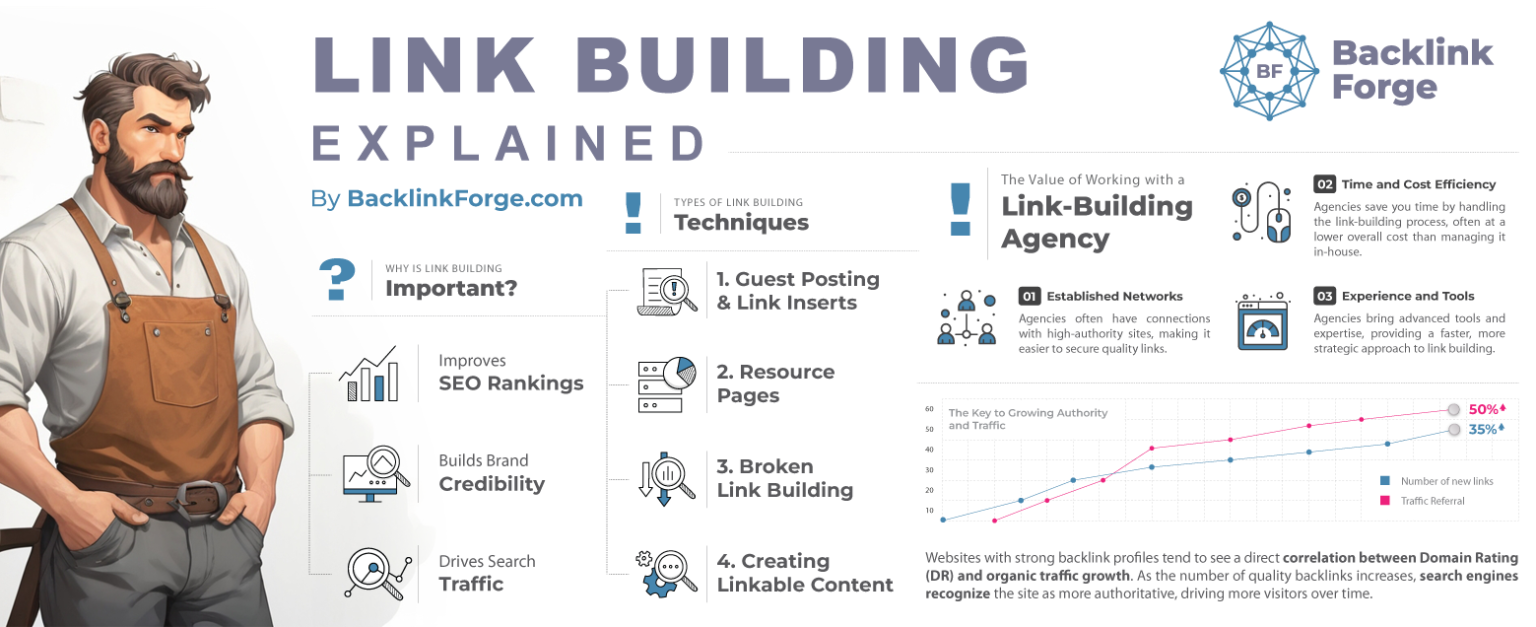What is Link Building?

Introduction
In today’s competitive digital landscape, having a strong online presence is more than just an advantage—it’s a necessity. Businesses and brands across industries are constantly seeking effective strategies to increase visibility, attract their target audience, and stand out from the crowd. One of the most impactful tools to achieve these goals is link building, a cornerstone of search engine optimization (SEO) that directly influences how search engines perceive and rank your website.
At its core, link building is the process of acquiring hyperlinks from other websites to your own. These links act as pathways that connect websites, signaling to search engines like Google that your site is relevant, credible, and authoritative. Much like how citations validate academic research, backlinks serve as endorsements that enhance your site’s reputation in the vast ecosystem of the internet.
The importance of link building extends far beyond improving search engine rankings. It’s a multifaceted strategy that drives referral traffic, introduces your brand to new audiences, and builds trust with both search engines and users. Links not only act as navigational tools but also as markers of quality, giving your site an edge in attracting organic traffic.
Understanding why link building matters begins with recognizing its broader impact. Quality backlinks are an essential ranking factor for search engines, but they also play a key role in shaping your brand’s digital authority. When your site earns links from trusted sources, it fosters a perception of reliability and expertise that resonates with both algorithms and audiences.
This guide will dive into the world of link building, covering its definition, significance for SEO, and the various methods and strategies to implement it effectively. Whether you’re new to SEO or looking to refine your approach, mastering link building can unlock countless opportunities for growth and success in the online space.

What is Link Building?
Link building involves securing hyperlinks from other websites to your own. These links—also known as “backlinks”—act like “votes” in the eyes of search engines. When reputable websites link to your site, they endorse your content, signaling to search engines that your site provides valuable information.
How Search Engines Use Links
Search engines like Google use complex algorithms that consider links as a major factor in determining the relevance and quality of a website. High-quality links from authoritative sites boost your website’s ranking in search engine results pages (SERPs), making link building an essential aspect of any effective SEO strategy.
Why Link Building is Important for SEO
Link building goes beyond just ranking factors. Here’s why it’s so crucial for SEO and overall brand success.
1. Authority and Credibility
Links from reputable sites are like votes of confidence, establishing your brand’s authority in its niche. If a respected publication links to your site, it sends a positive signal to users and search engines that your content is trustworthy.
2. Improved Search Engine Rankings
Links are a significant factor in determining a site’s position on SERPs. Search engines use backlinks to understand the content’s relevance, quality, and popularity. More quality backlinks usually mean better search rankings, driving more organic traffic to your site.
3. Referral Traffic
Backlinks don’t just impact SEO—they drive direct referral traffic as well. When a user clicks a link from another site to yours, they’re likely already interested in your content, meaning that link building often results in highly engaged visitors.
4. Brand Visibility and Awareness
Link building helps increase your brand’s visibility on reputable websites, making it easier for new audiences to discover you. Mentions on influential sites can boost brand awareness, authority, and even lead to partnerships and collaborations.
5. Long-Term Value
Quality backlinks tend to have long-term SEO value. Once you’ve secured links from reputable sites, they typically continue to provide SEO benefits over time, helping your brand maintain strong search engine performance.
Types of Links in Link Building
Understanding the types of links that contribute to an effective link-building strategy is crucial.
Dofollow vs. Nofollow Links
- Do-follow Links: These are standard backlinks that pass “link juice” or authority to your website, positively impacting SEO.
- No-follow Links: These links don’t pass SEO authority but still have value. They drive traffic and are beneficial for brand visibility, particularly from reputable sites like social media platforms.
Editorial Links
Editorial links occur naturally when other websites choose to link to your content because it adds value for their audience. This type of link often has the most impact on SEO, as it’s entirely organic and typically comes from sites with high authority.
- Guest Post Links and Link Inserts (Niche Edits): Guest posting involves writing an article for another website, usually in exchange for a link back to your site. This is one of the most popular link-building strategies as it allows you to share expertise with a new audience while earning a quality backlink.
- Link Inserts (Niche Edits): Unlike guest posts, link inserts involve inserting your link into an existing piece of content on another site. This tactic is often referred to as a “niche edit” and can be particularly effective for gaining high-quality backlinks on relevant, established content. By finding existing articles that align with your content, you can request a link to be added where it naturally fits. Link-building agencies often help secure these links by reaching out to relevant sites and offering valuable resources as additions.
Directory and Citation Links
Directory and citation links are common in local SEO, often found on business directories like Yelp, Google My Business, and industry-specific sites. These links establish a basic online presence and improve visibility, especially for local search results.
Resource Page Links
Resource pages are curated lists of useful links or tools in a particular niche. Securing a link on a high-authority resource page can drive targeted traffic and provide strong SEO benefits, especially if the resource page ranks well.
User-Generated Links (Comments, Forums, etc.)
Links from user-generated content (like blog comments and forums) may not hold much SEO value, but they can still drive niche-specific traffic. It’s essential to use this tactic thoughtfully, as spammy links from comments can have a negative effect.
White Hat vs. Black Hat Link-Building Techniques
Understanding the difference between white hat and black hat link-building techniques is critical to ensuring your efforts benefit SEO without risking penalties.
White Hat Techniques
White hat techniques focus on ethical, search engine-approved strategies. These include guest posting, creating valuable content, and building relationships with other websites. White hat strategies align with search engine guidelines and focus on providing genuine value to users.
Black Hat Techniques
Black hat link-building involves manipulative practices like link farms, hidden links, and paid links that violate search engine guidelines. These methods may provide short-term benefits but often lead to severe penalties, including site deindexing or lower search rankings.
Why White Hat Strategies are Recommended
White hat techniques build sustainable SEO and a positive online reputation. Link-building services that specialize in white-hat tactics help secure quality links while ensuring long-term success.
Common Link-Building Strategies
There are numerous ways to build links, but here are some of the most effective and sustainable methods:
Content Creation and Outreach
Creating high-quality, shareable content is one of the best ways to attract natural links.
- Blogging and Articles: Writing informative blog posts on trending topics or common issues can naturally attract backlinks.
- Infographics and Visual Content: Visuals like infographics are highly shareable, making them a great way to earn backlinks.
- Original Research and Case Studies: Data-driven content and case studies provide unique insights that other websites are likely to reference.
Guest Blogging and Link Inserts (Niche Edits)
Guest blogging and niche edits are popular strategies for earning backlinks.
- Guest Blogging: Writing articles for other sites establishes credibility and positions you as an expert in your field. Additionally, guest posts often include a backlink to your site.
- Link Inserts (Niche Edits): With link inserts, you reach out to existing content owners to add your link where it fits naturally. These edits save time compared to guest posts, as the content is already published and established.
Resource Link Building
Many high-authority websites have resource pages that link to useful content in their field. You can reach out to these sites and suggest your content as a valuable addition.
Broken Link Building
Broken link building involves identifying broken links on other websites, then suggesting your content as a replacement. This method adds value by helping webmasters fix broken links while providing you with a quality backlink.
Digital PR and Influencer Outreach
Reaching out to journalists, bloggers, and influencers to share your content can generate high-quality backlinks, especially if your content is newsworthy or informative.
HARO (Help a Reporter Out)
HARO connects journalists with expert sources. By responding to requests relevant to your industry, you can earn mentions in media articles, which often come with valuable backlinks.
Measuring the Success of Link Building
Tracking the effectiveness of link building is key to understanding its impact on your brand and SEO.
1. Backlink Quality
Use tools like Ahrefs, Moz, or SEMrush to assess the quality of backlinks, considering metrics like Domain Authority (DA) or Domain Rating (DR).
2. Referral Traffic
Referral traffic from backlinks can show how effective the link is in attracting engaged visitors to your site.
3. Improvement in Search Rankings
Quality link building typically correlates with improved rankings, so monitoring changes in rankings over time can indicate success.
4. Engagement Metrics
Metrics such as bounce rate, time on page, and conversions help measure the engagement of users who arrive via backlinks.
5. Growth in Brand Mentions
Link building often leads to more mentions of your brand across the web, which improves brand recognition and reach.
Link Building Challenges and How to Overcome Them
High Competition for Quality Links
Securing backlinks from high-authority sites can be challenging. Persistence and valuable content are essential for standing out.
Time-Intensive Process
Link building requires consistent outreach and relationship-building, which can be time-consuming. Outsourcing to a link-building agency can make the process more efficient.
Risk of Google Penalties
Low-quality or manipulative links can lead to penalties. Focusing on white-hat strategies helps avoid these risks.
How to Start Link Building
Building high-quality backlinks is essential for any brand seeking online visibility, authority, and improved SEO rankings. Here’s a step-by-step guide to launching your link-building efforts successfully, with a look at why partnering with a professional link-building agency can streamline the process and deliver superior results.
- Set Clear Goals
- Before diving into link building, it’s crucial to define your objectives. Knowing your goals will shape the direction of your strategy and help you measure success over time.
- Boosting Rankings: If your main goal is to improve your search engine rankings, you’ll want to focus on high-authority backlinks from reputable sites within your niche.
- Building Brand Awareness: Link building also serves to expand your brand’s reach. Links from popular, respected sites can help introduce your brand to new audiences and establish credibility.
- Driving Referral Traffic: In addition to SEO benefits, links from relevant sites drive referral traffic directly to your website, often resulting in engaged visitors who are already interested in your offerings.
Research Competitors
Studying your competitors’ backlinks provides insight into effective link sources within your industry. Analyzing competitor backlinks can help you identify opportunities and link-building methods that work well for similar brands.
- Identify Top-Performing Links: Use tools like Ahrefs, Moz, or SEMrush to uncover the highest-quality links pointing to competitor sites. Look at the sources of these links and consider whether similar links would benefit your brand.
- Evaluate Link-Building Tactics: Are your competitors using guest posts, resource pages, or outreach to secure links? By understanding their strategies, you can learn what’s most effective in your niche and create a plan to replicate or improve upon it.
Create Linkable Assets
Content that provides real value to your audience naturally attracts links. This is known as creating “linkable assets”—resources that other sites find valuable enough to reference or share.
- Guides and How-Tos: Detailed guides and tutorials offer practical insights that other sites may link to as a resource for their readers.
- Infographics and Visual Content: Visual assets like infographics are highly shareable and often attract links due to their ease of use and appeal.
- Data-Driven Studies or Reports: Original research, data analysis, and case studies offer unique information that journalists, bloggers, and other industry players frequently reference.
- Creating these assets requires time and resources, but once they’re published, they provide ongoing value and often attract organic backlinks over time.
- Develop an Outreach Strategy
- An outreach strategy is essential for promoting your linkable assets and securing quality backlinks. Effective outreach involves identifying relevant websites, personalizing your pitch, and building relationships with webmasters or content creators.
- Identify Relevant Sites: Search for websites, blogs, and publications that align with your industry and audience.
- Craft a Compelling Pitch: Personalize each message to highlight why your content is valuable to their readers. A tailored approach is more effective than mass outreach.
- Build Long-Term Relationships: Networking and fostering relationships with other websites in your industry can lead to ongoing link-building opportunities.
While manual outreach can be effective, it requires significant time and effort to manage. An experienced link-building agency can take on the outreach process on your behalf, ensuring consistent efforts and a higher chance of securing quality backlinks.
Track and Adjust
Monitoring the performance of your link-building efforts is essential to understanding what’s working and refining your strategy.
- Evaluate Backlink Quality: Regularly review the quality of your backlinks, focusing on metrics like Domain Authority (DA) or Domain Rating (DR) to ensure you’re securing high-value links.
- Measure Referral Traffic: Track the amount and quality of referral traffic generated from backlinks. Look for high engagement from visitors who arrive via links, as this indicates the relevance and value of the links.
- Adjust Strategy Based on Results: If certain link-building tactics aren’t delivering results, don’t be afraid to pivot. Testing different strategies and adjusting based on your findings will help you refine your approach.
Why Working with a Link-Building Agency is the Best Choice
While you can certainly tackle link-building in-house, there are many reasons why working with a dedicated link-building agency can be the most effective, efficient, and even affordable option in the long run:
- Expertise and Industry Knowledge: Agencies specialize in link-building and have extensive experience in what works and what doesn’t. They stay up-to-date on the latest SEO trends and algorithm updates, ensuring your brand’s link-building strategy remains effective and compliant with search engine guidelines.
- Time Savings: Link building, especially the manual outreach and relationship-building required for high-quality links, is incredibly time-intensive. An agency can handle every step of the process, from researching target sites and managing outreach to securing and tracking backlinks. This allows your team to focus on other essential aspects of your business.
- Established Relationships: Link-building agencies often have existing relationships with high-authority websites and influencers across various industries, which can lead to quicker placements and better-quality links. These connections are difficult to build from scratch, making agency partnerships highly valuable.
- Cost-Effectiveness: While hiring an agency involves upfront costs, it can be far more cost-effective over time. In-house link building requires hiring, training, and paying a full-time team, not to mention the additional tools and resources needed. A professional agency, however, provides a scalable and efficient approach to link building without the added overhead of managing an in-house team.
- Access to Advanced Tools and Resources: Agencies typically use advanced SEO tools, competitor analysis software, and outreach platforms to optimize their link-building campaigns. These tools can be costly if purchased individually but are included as part of agency services.
- Avoiding Costly Mistakes: Agencies are well-versed in white-hat link-building practices and understand how to avoid tactics that can result in search engine penalties. Poor-quality links or black-hat tactics can cause severe, costly damage to your SEO performance. Working with a reputable agency ensures that you’re building a strong, penalty-free backlink profile.
Choosing the Right Approach
Starting link building requires clear goals, targeted research, valuable content, a strategic outreach plan, and careful monitoring. While it’s possible to handle link-building independently, partnering with a professional agency offers a range of benefits, from expertise and efficiency to cost savings and quality assurance.
Ultimately, working with a link-building agency helps you maximize the ROI of your link-building efforts, allowing you to build a robust and sustainable backlink profile that supports your SEO goals and drives meaningful results for your business.
How to Promote Your Brand In 2025?

In today’s competitive digital world, standing out online requires more than just a good product or service—it demands strategic visibility. One of the most impactful ways to grow your brand’s presence is by being featured on other websites.
Regardless of whether it’s through articles, reviews, interviews, or shoutouts, these features amplify your reach, enhance your credibility, and drive valuable traffic to your website.
Why Being Featured Matters
Features on other websites provide significant benefits to your brand, influencing both perception and performance. They expand your visibility by putting your name in front of new audiences. A mention on a niche blog, for example, can expose your business to a community of readers already interested in your industry.
Additionally, features help build trust and authority. When a credible website talks about your brand, it signals to potential customers that you are a reliable and respected player in your field.
Moreover, these mentions also drive referral traffic. Readers who click through to your site from a feature are often more engaged and ready to take action, whether it’s signing up, making a purchase, or exploring your offerings further.
Features as a Conversion Tool
Being featured isn’t just about getting your name out there; it is also a proven method to boost conversions. When customers see your brand highlighted on a reputable platform, it acts as social proof. People are more likely to trust and purchase from a brand that others recommend. This trust factor translates directly into higher conversion rates.
Moreover, features ensure your brand remains visible during key moments in a customer’s decision-making process. If someone discovers your product while researching options on a trusted site, they’re more likely to choose you over competitors.
The SEO Benefits of Features
Features do more than attract customers—they also boost your SEO.
Backlinks are one of the most valuable byproducts of being featured. A backlink is a hyperlink from another website to yours, and search engines see these links as endorsements of your site’s credibility and relevance.
For example, if a popular industry blog links to your website in a feature, that backlink can enhance your search rankings for targeted keywords. In addition to rankings, backlinks diversify your traffic sources, making your site less dependent on any single channel.
How Features Tie into Link Building
Most features and mentions don’t happen by accident; they’re the result of deliberate link-building efforts. This makes link building an essential strategy for gaining high-quality features that boost both brand visibility and SEO performance.
Guest posts are a classic example. By contributing content to other websites, you position yourself as an expert while securing a backlink to your site. Another method is link inserts (or niche edits), where your link is added to existing content on a website, placing you within a context that’s already trusted by readers.
Collaborations with influencers or brands also often result in features that include backlinks. These partnerships are mutually beneficial, providing exposure for all parties involved.
Examples of Success Through Features
Consider the story of a small local bakery that was reviewed on a popular food blog. The feature included a link to their website, leading to a significant spike in foot traffic and online orders.
Similarly, a SaaS company partnered with a tech website for an in-depth review of their product. The resulting feature drove thousands of qualified leads to their landing page in the first few weeks. These examples illustrate the potential of being featured in the right places.
Getting Featured: Practical Tips
While features are incredibly valuable, securing them requires a proactive approach.
Identify Relevant Websites
Look for blogs, media outlets, or industry websites that cater to your target audience. Use tools like Ahrefs or SEMrush to find sites with strong domain authority.
Create Link-Worthy Content
Develop high-quality content that others will want to feature. This could be a how-to guide, original research, or an eye-catching infographic.
Engage in Outreach
Build relationships with website owners, editors, or bloggers. Personalize your outreach messages and highlight how your content aligns with their audience.
Leverage PR Opportunities
Submit press releases or pitch story ideas to journalists in your niche. A well-placed story in an industry publication can have a significant impact.
Hire a Link-Building Agency
Agencies specialize in securing high-quality features and backlinks for their clients. They already have the networks and tools to make the process seamless and effective.
Why Agencies Make Sense
While it’s possible to handle link building and outreach yourself, partnering with an agency is often the most efficient and cost-effective route. Agencies have established relationships with high-authority websites and can tailor strategies to your specific needs.
By outsourcing this work, you not only save time but also ensure that your features come from reputable, high-traffic sources that boost your credibility and SEO.
Measuring the Impact of Features
Once you’ve secured a feature, it’s essential to track its impact. Monitor referral traffic using tools like Google Analytics to see how many visitors are arriving from the feature.
You should also evaluate conversions—are visitors taking action, such as signing up for a newsletter or purchasing a product? Additionally, use SEO tools to track how features affect your search rankings and backlink profile.
The hidden marketing power of being featured on other websites lies in its ability to enhance visibility, build trust, and drive both traffic and conversions. These features also provide SEO benefits through high-quality backlinks that boost your search engine rankings.
By incorporating a strategic link-building approach—through guest posts, link inserts, or collaborations—you can maximize the impact of these features. Whether you handle the process in-house or partner with a professional agency, being featured on the right websites is a transformative marketing strategy that every brand should leverage.
How to Build Your Brand Online?

Building a strong online reputation is crucial for brands in today’s digital landscape. Consumers are increasingly influenced by what they read about a brand online, and a positive online reputation can establish trust and credibility that set a business apart. A powerful way to enhance your brand’s online presence is through partnerships with trusted, influential organizations, publications, and personalities.
To achieve these partnerships, companies are usually reaching out for services like link-building, a process in which articles containing links towards a brand’s webpage are published by influential blogs, news outlets, and influencers.
Being mentioned or featured on reputable websites, blogs, and social media channels, helps build your credibility with both audiences and search engines. This is where link-building agencies like BacklinkForge can support your efforts—by securing partnerships that create quality backlinks, strengthening your SEO efforts while building your brand’s reputation in the process.
Types of Strategic Partnerships That Can Elevate Your Brand
Not all partnerships are equal. Depending on your industry, certain brand mentions and inbound links are more influential than others. Here are some of the most impactful types of partnerships for growing your brand’s online reputation:
Media Partnerships
Collaborations with reputable publications, news websites, and online magazines help position your brand as an authority in your field. These media mentions often lead to natural-looking backlinks, which enhance SEO and bring qualified traffic to your site. Link-building services, such as Guest Posts, can help you secure these media mentions to support your brand visibility.
Influencer and Blogger Collaborations
Partnering with influencers and bloggers can give your brand access to new audiences. They help humanize your brand, and if they include a link back to your site, it benefits both brand perception and SEO. The fastest and cheapest way to benefit from these potential partners, is through a process called Link Insertion (Niche Editing). Selecting an already successful blog post and negotiating a link placement within that post can can sometimes be best way to achieve a new link.
Industry Authority Partnerships
Working with recognized organizations and thought leaders in your industry can significantly boost your brand’s reputation. Mentions and backlinks from industry authorities improve the credibility of your businesses and help establish your brand as a trusted name in your niche. Link-building services can assist in identifying and connecting you with these high-authority sources that are willing to link towards your content, even though you might be their competitor. To achieve this, link building agencies rely on established connections with industry leaders across different niches, and leverage their own domains and tools to secure these links for you.
Nonprofit and Cause-Based Partnerships
Collaborations with nonprofits, educational, or charitable organizations show your brand’s commitment to social causes. These partnerships enhance reputation by showcasing values alignment and often lead to additional natural mentions on respected websites, adding to your brand’s online visibility.
How to build and Nurture Successful Partnerships with Key Influencers
A successful partnership isn’t a one-time effort—it requires careful outreach, collaboration, and an ongoing communication. The best and the most effective way is to rely on agencies specialized in these types of services, as they lobby on your behalf through already established channels of communication. Process is usually complex and costly, and often results in a single post (one link) published by your new partner.
You can also try to establish these partnerships yourself. Here are some key steps in that process:
Understanding Your Industry
Having a deep understanding of your industry and the public perception of key opinion leaders in your field is critical in identifying potential bloggers or news websites for collaboration. Most of those on top (take for example national news outlets) will not consider writing an article about a local business, which is why, is important to find a way to create Mutually Beneficial Collaborations, as described in the Step 4.
Identifying Partners
Taking aside word-of-mouth marketing, successful identification of influencers and websites with a solid reach and online reputation can come from some of the specialized SEO tools, such as SEMRush or aHrefs for example. Using some of their features such as content gap analysis, brands can find the potential partners writing on the subjects of interest.
Outreach and Pitching
Start by reaching out to potential partners with a personalized pitch. Explain why the collaboration would benefit both parties. A link-building service can help with outreach by crafting persuasive pitches and securing high-quality partnerships on your behalf.
Creating Mutually Beneficial Collaborations
Partnerships work best when both parties gain value. Consider ways you can add value to your partners, whether through content contributions, shared promotions, or product offerings. Link-building services can also help foster win-win collaborations, ensuring both you and your partners see the benefits.
Maintaining Long-Term Relationships: Build relationships for the long term by maintaining open communication, supporting partners’ initiatives, and reciprocating when they promote your brand. Keeping these partnerships going strong often leads to further link opportunities and increased exposure over time.
Measuring the Impact of Published Links on Brand Reputation
To understand the success of your partnerships, it’s essential to track relevant metrics and evaluate the impact on your brand’s reputation.
Key Metrics to Track
Metrics such as referral traffic, referral links, engagement rates, brand mentions, and sentiment all help assess a partnership’s success.
Tools for Monitoring Success
Use tools like Google Analytics and social listening tools to track metrics. Link-building agencies can support by monitoring and evaluating partnership performance, helping you identify which relationships yield the most value for your brand.
Regularly Adjusting Strategy
As you track the results, be prepared to adjust your strategy. Partnerships are most effective when they’re actively managed and improved based on results. This can involve changing an anchor text, acquiring links from a related niche, etc… By partnering with a link-building agency, you can gain insights into high-impact opportunities and fine-tune your approach.
Strategic partnerships are a powerful way to build a trusted online reputation. By working with reputable organizations, influencers, and media, you can boost your brand’s visibility and authority, helping your audience view your brand as a credible and reliable choice.
If you’re ready to explore how partnerships and link-building can work together to grow your brand, start by identifying potential partners that align with your brand’s values and goals, or consider hiring with a link-building agency to help you build those connections.





